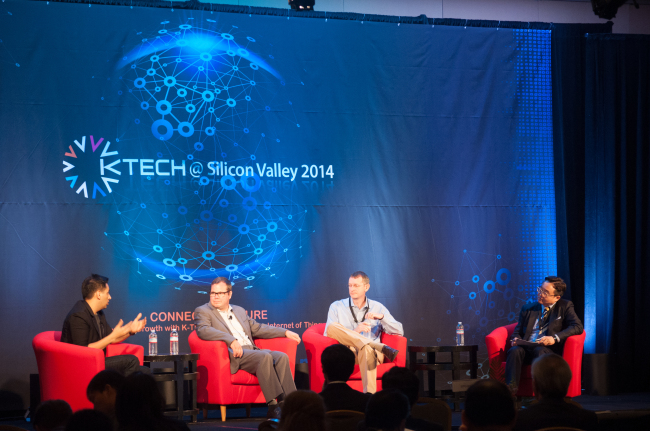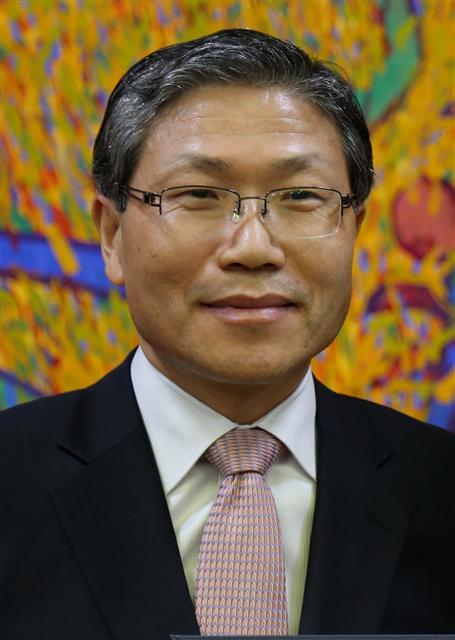Marking its third edition, Korea’s recent big showcase event in Silicon Valley, K-Tech 2014, focused on the Internet of Things ― and the “connected future.” Close to 1,000 people attended, along with more than 100 Korean companies, including more than 20 promising Korean startups.
The event was quite successful. Vice Minister of Science, ICT and Future Planning Yoon Jong-lok offered his support to participating companies and briefed attendees on the Korean government’s policies on promoting the creative economy, including the basic plan on the Internet of Things, as set forth last May in preparation for a new world of interconnectedness.
I believe that an important task that needs to be worked through in the IoT era will be the establishment of a dominant standard and platform. In this sense, I believe the goals of Silicon Valley companies and Korean companies are identical, and both must pursue the IoT development through strategic cooperation and technological innovation.
California is the world’s eighth-largest economy, and the San Francisco Bay Area alone would rank 19th, right after Switzerland. This is largely thanks to the Silicon Valley region, which in 2013 sourced 77 percent of all venture capital investment in California and 30 percent of venture investment in the U.S. Silicon Valley saw 46,665 new jobs created in the second quarter of 2013, the largest quarterly increase in the last decade. More patents are applied for from here than anywhere else in the U.S., with a gross domestic product of $252 billion in 2013.
It is no wonder this region is an inspiration for Koreans.
Having recently ranked first in Bloomberg’s Global Innovation Index, today Korea is a technological powerhouse in its own right, a choice destination for members of Silicon Valley’s high tech community. We look to Silicon Valley in search of partnerships, cooperation and investment, as well as ideas and further inspiration, as we search for new growth engines to power our economy.
The event was quite successful. Vice Minister of Science, ICT and Future Planning Yoon Jong-lok offered his support to participating companies and briefed attendees on the Korean government’s policies on promoting the creative economy, including the basic plan on the Internet of Things, as set forth last May in preparation for a new world of interconnectedness.
I believe that an important task that needs to be worked through in the IoT era will be the establishment of a dominant standard and platform. In this sense, I believe the goals of Silicon Valley companies and Korean companies are identical, and both must pursue the IoT development through strategic cooperation and technological innovation.
California is the world’s eighth-largest economy, and the San Francisco Bay Area alone would rank 19th, right after Switzerland. This is largely thanks to the Silicon Valley region, which in 2013 sourced 77 percent of all venture capital investment in California and 30 percent of venture investment in the U.S. Silicon Valley saw 46,665 new jobs created in the second quarter of 2013, the largest quarterly increase in the last decade. More patents are applied for from here than anywhere else in the U.S., with a gross domestic product of $252 billion in 2013.
It is no wonder this region is an inspiration for Koreans.
Having recently ranked first in Bloomberg’s Global Innovation Index, today Korea is a technological powerhouse in its own right, a choice destination for members of Silicon Valley’s high tech community. We look to Silicon Valley in search of partnerships, cooperation and investment, as well as ideas and further inspiration, as we search for new growth engines to power our economy.

Naturally other countries are vying for a position in technological development and innovation in the valley. India, China, Israel, France, the U.K. and other countries have resident government officials at their consulates dedicated to the support of their compatriot companies, and to stay abreast of trends and developments. The Silicon Valley branch of The Indus Entrepreneurs organizes a massive event every year known as the TiE Conference that is immensely popular even among non-Indians. The Israelis organize the California-Israel Summit each year, while Canadians support each other through an organization called the C100.
Amidst the rapid change and innovation we see today, we must continuously find ways to be one step ahead of new global megatrends and create growth engines for the future. In order to build an ecosystem that the way in the era of unlimited competition and dominate the agenda, we need capital, technology, and networking, and we need to to bring these things together through organic cooperation between government and the private sector.
Korea remains a global technology leader. In terms of capital, one promising example would be a recent agreement between the Small and Medium Business Administration and the venture firms Draper Fisher Jurvetson and Walden International to create a $150 million fund devoted to Korean startups. When it comes to networking, Koreans are latecomers to Silicon Valley.
But already K-Tech has become the biggest venue for networking between Koreans and their overseas counterparts there, and the Korean Consulate in San Francisco holds a monthly Creative Economy Forum that has attracted the attention of a wide variety of players in the region. The consulate also publishes Silicon Valley Industry Trends, a weekly newsletter that is available on our website.
There is much discussion in Korea about how Koreans can emulate Silicon Valley. Promoting a better ecosystem for a creative economy is a true national priority. But we urgently need to become more active where there is the most action.

By Han Dong-man, Consul-general in San Francisco










![[Hello India] Hyundai Motor vows to boost 'clean mobility' in India](http://res.heraldm.com/phpwas/restmb_idxmake.php?idx=644&simg=/content/image/2024/04/25/20240425050672_0.jpg&u=)








